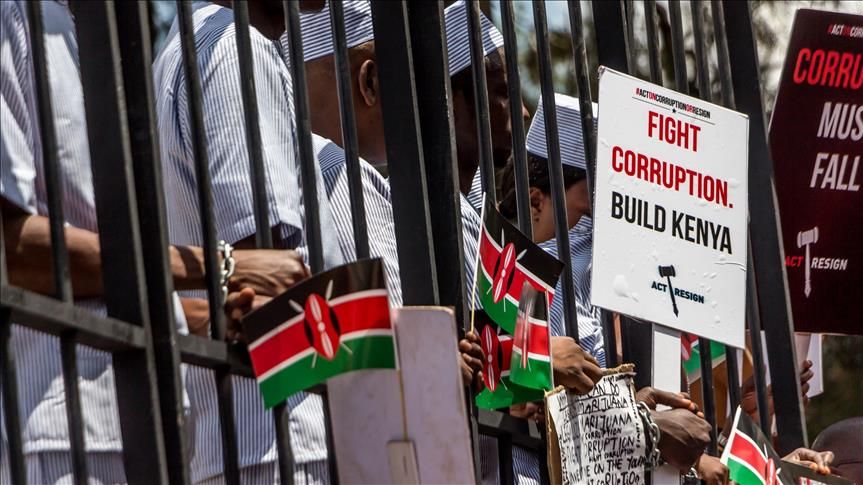- Socio-economic development has been constrained by widespread corruption and mismanagement in Kenya.
- The debt constraint will not just affect headline macroeconomic variables, but will also have an impact on the lives of Kenyans, a new report says.
- The variation in unemployment, inflation, and broader economic growth will also have a clear impact on poverty levels.
Kenya’s potential for socio-economic development in the coming decade is no longer promising, a new report has revealed.
The report titled ‘Kenya in 2040: Mapping Kenya’s Future’, which was jointly produced by Oxford Economics Africa and the Institute of Economic Affairs (IEA), a Kenyan think tank, says the earlier projected outlook of the country’s GDP growth beyond 5 per cent, and a consolidated position as the gateway into Africa, is slowly diminishing.
It says Kenya’s socio-economic development has been constrained by widespread corruption and economic mismanagement.
“The former has led to considerable fiscal slippage, and Kenya’s fiscal position remains a perennial concern, weighing on both service delivery and the effectiveness of government investment,” the report says.
It notes that as a result of the corruption, public debt, in proportion to the country’s GDP, has nearly doubled over the past decade, trending just under 70 per cent by the end of 2021.
Borrowing costs have also increased, and the government has been forced to absorb a large proportion of domestic credit. This means the private sector has been starved of this potential borrowing.
Official data shows the country’s debt stood at Sh10.4 trillion by March this year and had breached the statutory ceiling of Sh10 trillion in December last year to reach Sh11.13 trillion.
Corruption and Mismanagement in Kenya
However, the protests that were spearheaded by Kenyan youth led to the withdrawal of the Bill. As a result, President William Ruto announced that the government will be compelled to borrow close to Sh1 trillion in the 2024/25 Financial Year, adding to the country’s already high debt burden.
He directed further austerity measures and ordered the National Treasury to cut down the national budget by Sh177 billion to partly cater for the Sh346 billion revenue shortfall.
The IEA says a combination of the looming unproductive fiscal spending, slower revenue growth due to more measured economic expansion, and higher borrowing costs will see the state struggle with debt repayment in coming years.
The debt constraint will not just affect headline macroeconomic variables, but will also have an impact on the lives of Kenyans, the report says.
A case in point is the varying trajectories in the unemployment rate. In the best-case scenario, the report says Kenya’s unemployment rate will continue on a downward trajectory, falling from the current figure of around 27 per cent to 18 per cent by 2040.
In the worst-case scenario, it says the rate will continue to trend higher, breaching the 30 per cent threshold towards the end of the forecast period. This means that nearly one in three Kenyans, able to work and actively looking for employment, will be unable to find a job.
The variation in unemployment, inflation, and broader economic growth will also have a clear impact on poverty levels. A large proportion of the population will spend much less than the average figure, even in the most optimistic scenario, the report says.
Citing the World Bank estimates that the income share held by the poorest 20 per cent of households equated to 6.2 per cent in 2015, the report says if the current corruption and mismanagement landscape remains as it is, about 20 percent of Kenyans will in the worst-case scenario live under $0.5 (Sh70) per day by 2040, or $1.3 (Sh170) per day in the better-case scenario.
It has been over a decade since Kenya adopted a new constitution, which ushered in the establishment of county governments, an independent electoral body, a constitutionally incumbent Judiciary, and a bicameral parliament.
With the new constitution, Kenyans beamed with the hope of overcoming post-colonial development challenges such as inequalities in service delivery, poor governance, and a lack of progress at the grassroots.
However, IEA says the constitutional experiment is ongoing but with notable challenges, including incomplete implementation of administrative and institutional measures. Political and legal crises, reduced effectiveness of institutions, and general instability are further challenges.
“These challenges are manifested through corruption; arbitrary passing of laws by Parliament, political interest groups, tribalism, and special interest appointments,” the report says.
It also cites the widespread lack of public participation in the review and development of policies, the lack of proper consultation among government institutions, and delayed service delivery in counties, largely because of delayed disbursements, as further manifestations of corruption.
Read Also: Corruption and cybercrime emerge as biggest threats facing Kenyan firms
Another major challenge is the failure of both the national and county governments to effectively separate government functions, which has created confusion in critical sectors such as health, education, agriculture, and infrastructure.
Going forward, the economic think tank notes that the frequent attacks by the executive on independent institutions, such as disobeying court orders, undermining the Judicial Service Commission, and deliberately cutting the Judiciary’s budget allocation, will continue to hinder its ability to deliver justice and uphold the constitution.
“Public service delivery at the county level also continues to suffer, despite the intention of its improvement laid out in the constitution. Therefore, Kenyans are yet to reap the full benefits of the country’s fundamental laws.”
